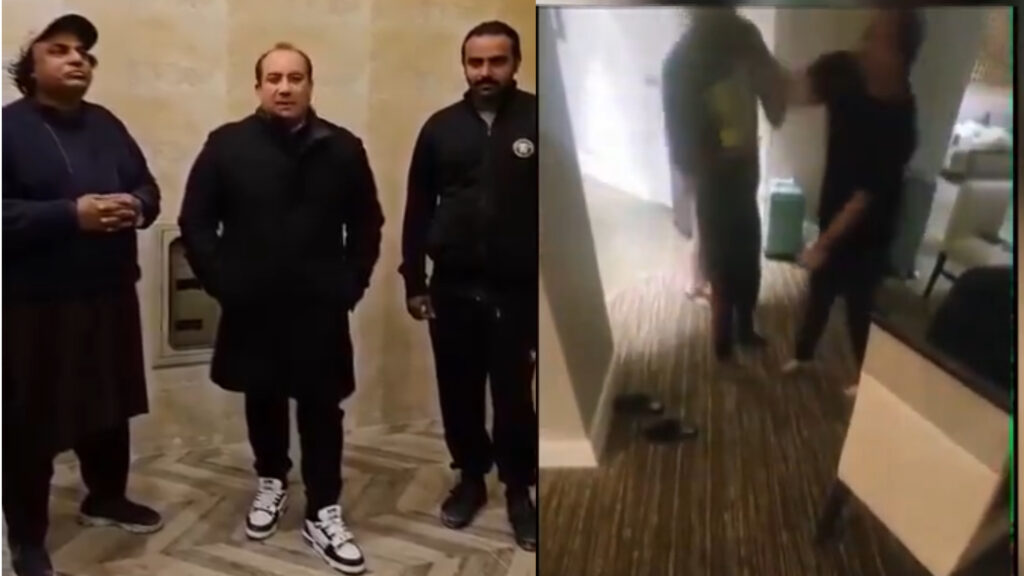A widely circulated video recently showed renowned Pakistani singer Rahat Fateh Ali Khan in a physical altercation with an individual, sparking significant public reaction. In the footage, Khan, dressed in a traditional dark kurta, can be seen striking a man several times.
Read the full video below.
Viral Video:
First Video https://x.com/ghulamabbasshah/status/1751266851450179696?s=46&t=-mljq7O1p9D0DSxsBH2LGw
The incident apparently stemmed from an issue concerning a missing bottle. Khan is overheard in the video inquiring about this particular bottle as he engages in the physical confrontation.
Subsequently, in response to the widespread sharing of this video and the resulting backlash, Rahat Fateh Ali Khan issued a clarification. In a follow-up video, he explained that the individual involved was one of his students who had erred, leading to the punishment seen in the viral clip. However, Khan also mentioned that he had later offered an apology to his student.
The individual who was on the receiving end of the physical actions, in his own statement, referred to the lost bottle as containing ‘dam kiya huwa pani’ or blessed water. He addressed the situation by defending Khan, his teacher, suggesting that the dissemination of the video was an attempt to malign his mentor. He expressed that there was no ill-will following the incident, emphasizing the respect and reverence he holds for Rahat Fateh Ali Khan, whom he likened to a father figure and spiritual guide. He indicated his understanding of the situation, stating that there is nothing amiss in a paternal figure disciplining their ward.
Further reinforcing this narrative, the student, in another statement, shared that Rahat Fateh Ali Khan had approached him to apologize for the incident. He reiterated his deep respect for Khan, describing him as akin to a father and a spiritual mentor. He expressed his view that the controversy generated by the video was an unjust attempt to extort or blackmail his teacher.
Adding to these sentiments, the father of the student also made a statement alongside Rahat Fateh Ali Khan. He echoed similar sentiments, suggesting that it is not uncommon or inappropriate for a mentor or master to discipline their disciple in such a manner.
The incident and the reactions it elicited highlight complex dynamics of teacher-student relationships in certain cultural contexts. While the physical act caught on video was met with initial shock and disapproval, the subsequent explanations and statements by those involved painted a picture of deep-rooted respect and deference towards Khan, underscoring his role as more than just a teacher but also a paternal and spiritual figure.
This incident has sparked conversations about the boundaries of mentorship and the acceptable limits of disciplinary actions within educational or apprenticeship contexts. It also sheds light on the power dynamics inherent in such relationships, especially when they are rooted in traditional or cultural practices.
In summary, while the video initially caused outrage and concern, the subsequent clarifications and statements have provided a broader context to the incident, framing it within a cultural perspective that values respect for elders and mentors, even when it involves disciplinary measures. The event has raised questions about the nuances of teacher-student relationships and the complexities of respecting cultural practices while ensuring appropriate conduct in mentorship roles.
The viral video involving Rahat Fateh Ali Khan and his student has sparked a wider debate on the nature of guru-disciple relationships, particularly in South Asian cultures where such bonds often transcend conventional teacher-student dynamics. The incident has opened up discussions about the cultural nuances that govern these relationships, where respect and reverence towards a guru or mentor are deeply ingrained.
In many South Asian traditions, a guru or teacher is accorded a status akin to a parental figure, making their role significantly influential and respected. The acceptance of the student’s family, as evidenced by the father’s statement, further reinforces the deep cultural roots of this tradition. However, this incident has also brought to the fore questions regarding the boundaries of this revered relationship, especially in the context of modern views on personal rights and acceptable forms of discipline.
Critics argue that regardless of cultural contexts, there should be clear limits to how a mentor exercises authority over a disciple, particularly concerning physical discipline. Advocates for a more contemporary approach to mentorship emphasize the importance of mutual respect and the need for methods that do not involve physical altercations, regardless of the intentions or subsequent resolutions.
Second Video :
https://x.com/rizwanbabararmy/status/1751284506060116116?s=46&t=-mljq7O1p9D0DSxsBH2LGw
This complex interplay between traditional cultural practices and contemporary perspectives on mentorship and discipline reflects an ongoing evolution in societal norms and values. It highlights the challenge of balancing respect for cultural heritage with the need to adapt to evolving views on individual rights and appropriate behavior in educational or mentorship settings.
In essence, the Rahat Fateh Ali Khan incident has become more than just a viral video; it’s a catalyst for an important conversation on the dynamics of power, respect, and appropriate conduct within culturally significant relationships. The diverse reactions to the incident illustrate the varying perspectives that exist within society about the limits of tradition and the need for evolving approaches to mentorship and discipline.

